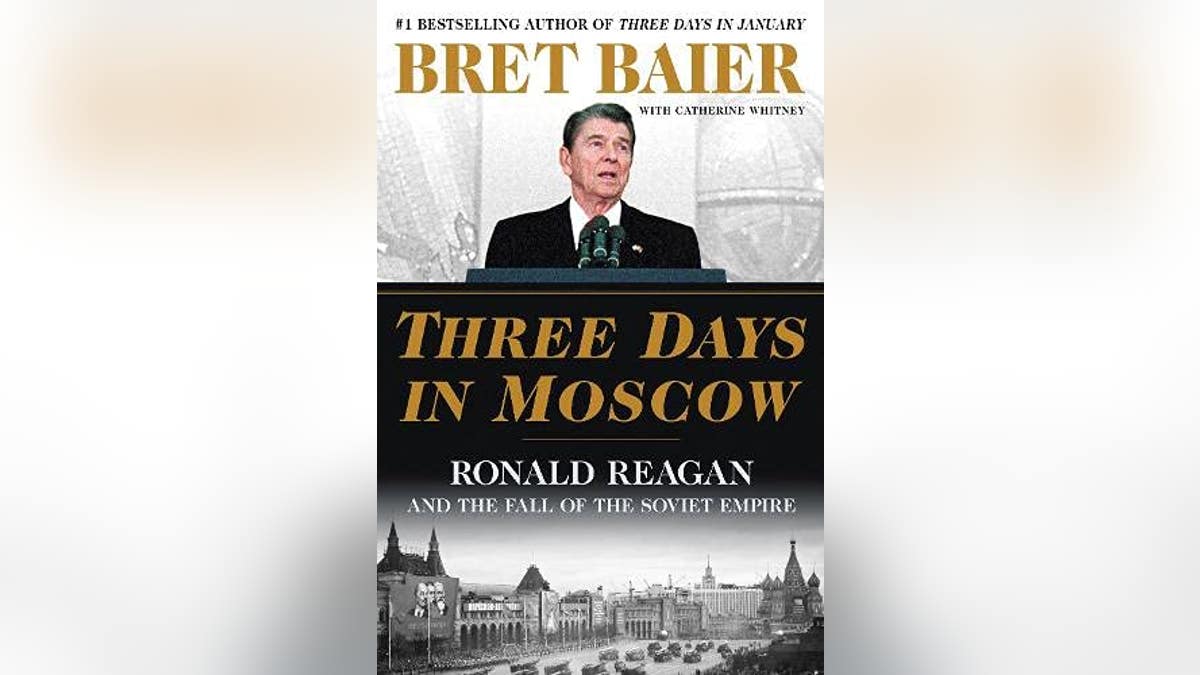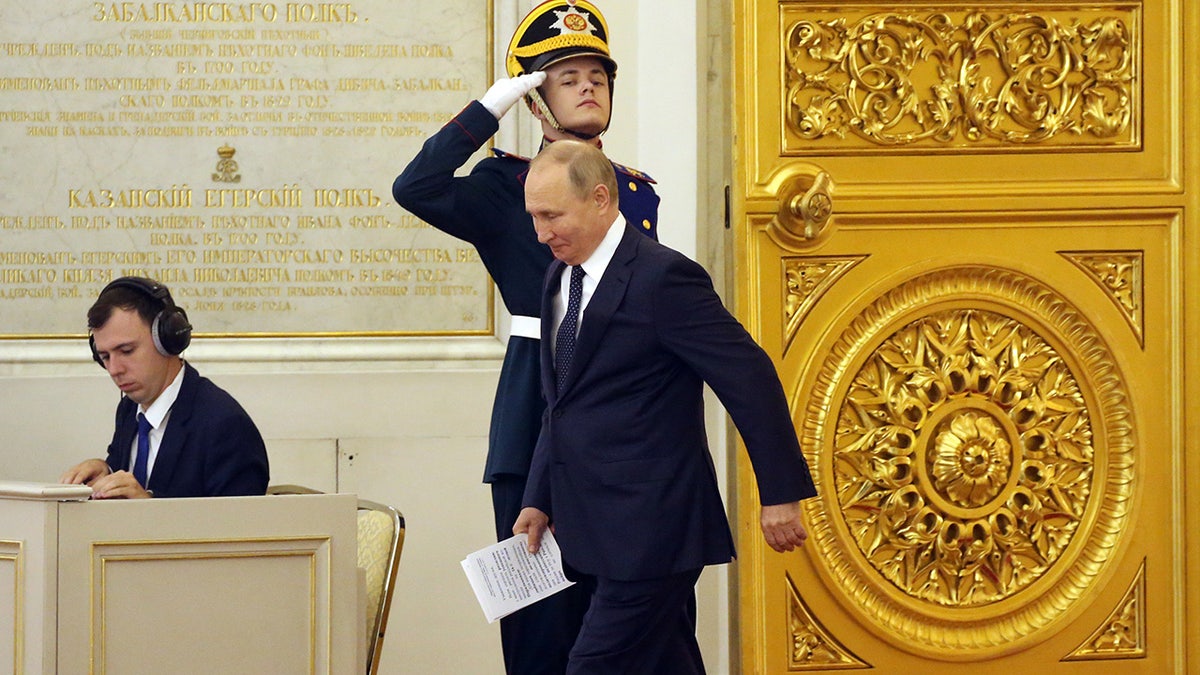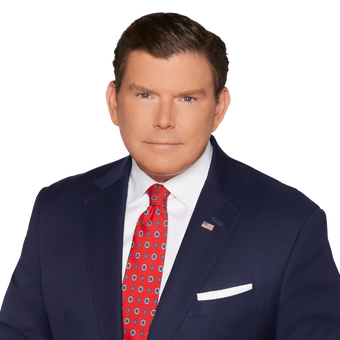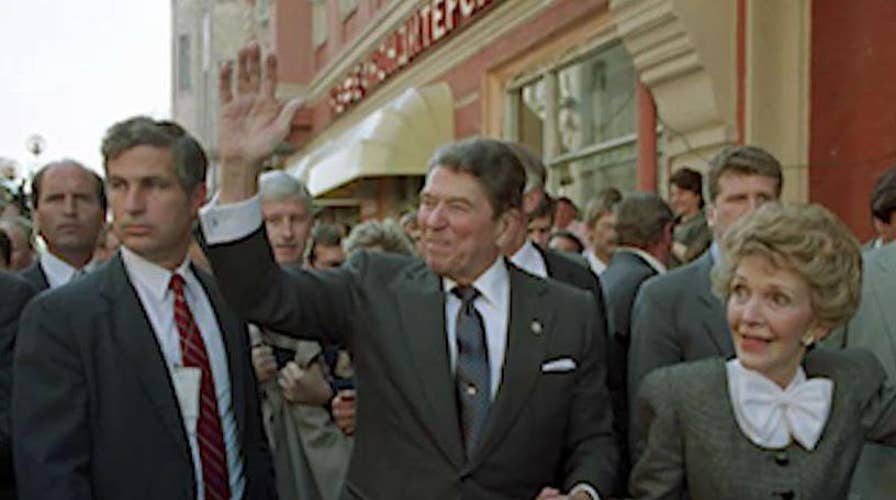'Three Days in Moscow'
Bret Baier takes a look into the end of the Cold War and President Reagan's role in collapsing the Soviet Union.
In May 1988, President Ronald and Nancy Reagan made a historic trip to Moscow, in the heart of the Soviet Union. Thirty years later, when I spoke with former Reagan aides for my book, Three Days in Moscow: Ronald Reagan and the fall of the Soviet Empire, they still had vivid recollections of that visit.
They remembered the warmth of the people, the desperation and courage of the refuseniks they visited, the opulence of the Grand Kremlin Palace where they met with Soviet leader Mikhail Gorbachev, the ubiquitous presence of KGB agents dressed up as ordinary citizens, asking propaganda-laced questions, and the hope in the eyes of the students who gathered at Moscow State University to hear the president of the United States speak.
I’ve often thought of their stories of an empire on the brink of falling, and of Reagan’s unwavering conviction that given an opportunity, people will always choose freedom. That message has new resonance today.
RUSSIA INVADES UKRAINE: LIVE UPDATES
Reagan had come into office nearly eight years earlier an avowed enemy of the Soviet Union. He called it "the evil empire" and predicted it would be consigned to "the ash heap of history."
No president had ever used such strident language before. Even Nancy begged him to tone it down. He refused, and the American people were largely behind him. The post-World War II generation had lived with the Cold War threat all their lives, and they believed the Soviet Union was the biggest danger to America.

Reagan kept the heat on the Soviets in the early years of his presidency, but there seemed to be little room for progress. Then, in 1985, things changed when Mikhail Gorbachev ascended to leadership.
Gorbachev was known to have some modern ideas, such as glasnost, which introduced a new openness; and perestroika, a proposal to restructure the old Communist economic model. Reagan took Gorbachev’s measure and declared, "He’s a new kind of Soviet leader."

FILE – Former President of the Soviet Union Mikhail Gorbachev attends a symposium on security in Europe 25 years after the fall of the "Wall" in Berlin on November 8, 2014. Gorbachev warned in Germany on November 7, 2014, of new East-West tensions sparked by the Ukraine crisis, speaking ahead of ceremonies commemorating the fall of the Berlin Wall. ((Photo credit: ODD ANDERSEN/AFP via Getty Images))
Reagan and Gorbachev recognized that they had one purpose in common. With nuclear arsenals poised to strike each other at the push of a button, they felt a joint obligation to try and reduce the threat of a nuclear engagement ever occurring. Whether they could manage to wade through decades of hostility to reach common ground remained to be seen. Many American foreign policy experts thought Reagan was hopelessly naïve for trying. But he went ahead with a series of summits with Gorbachev.
Beginning with the first summit in a lakeside chateau outside Geneva, in November 1985, the two men embarked on a years-long effort to find common ground on relieving the Cold War threat. Their summits were often tense, exhausting, and unproductive, but bit by bit they moved toward certain agreements. In the process they began to understand each other, and they even reached a fragile friendship.
Reagan would often spar with Gorbachev, who although more open than his predecessors was still faithful to the Party line. In Reykjavik, Iceland, they came to an icy standoff, with Gorbachev despairingly declaring, "I don’t know what more I could have done," and Reagan responding, "You could have said yes," before walking away.
It was some time before they met again, but the point is, they did meet again. They never gave up on their grand mission of preventing the likelihood of nuclear conflict.
Six months before the Reagans visited Moscow, Gorbachev and his wife Raisa came to Washington, D.C., where the leaders would sign a treaty to reduce intermediate-range nuclear weapons.
Gorbachev was hugely popular in America, even as he struggled with declining confidence back home. Americans loved Gorbachev’s western mannerisms, his smile, his fashionable wife. They liked that he called our president by his first name. He seemed to represent a new era. Riding down Connecticut Avenue at the lunch hour, Gorbachev suddenly hopped out of his car and walked, instantly mobbed by crowds of people shouting, "We love you!"
This successful visit set the stage for the Reagans’ trip to Moscow. While there, Reagan would echo Gorbachev’s populist performance, strolling through Red Square and then taking a spontaneous walk with Nancy in the Arbat neighborhood, where they too were mobbed by cheering locals. Reagan didn’t mind when rough KGB agents arrived to break up the crowd. It made his point.
With Gorbachev, Reagan always had a broader objective than just discussing nuclear arms. He often pressured the Soviet leader about human rights concerns and was particularly outspoken about the repression of the Jewish community. He never missed an opportunity to point out the differences between the two nations, speaking of freedoms in the United States that did not exist in the Soviet Union.
Though he never revealed it to Reagan, by then Gorbachev knew that the Soviet system was failing. In his 2011 book, The New Russia, Gorbachev wrote of his growing awareness of the Soviet plight: "A dead-end political situation, economic stagnation, a build-up of unresolved social problems, violation of the rights and dignity of citizens."
The modern world—the free world—was pushing against the limitations of Soviet ideology. The mighty façade was cracking as the republics under Soviet domination, including Ukraine, rebelled and demanded independence. The economy cratered as the foolish quest for dominance, epitomized by the invasion of Afghanistan, took its toll. The Soviet program of empire-building was economically unsustainable.
And the people no longer wanted to live that way. The Politburo was increasingly out of touch with the populations under its control. In 1989, the Berlin Wall fell amid a popular uprising, as rebellions continued in Soviet states. Ukraine declared its sovereignty in July 1990, and seceded from the Soviet Union in the summer of 1991, in the wake of a failed coup.
On Christmas Day 1991, Gorbachev resigned, and the following day the Soviet Union was dissolved.
We now know of one man who refused to accept the end of the Soviet Union—Vladimir Putin. At the time of Reagan’s visit, Putin was a young KGB operative stationed in East Germany. Over the years he came to power, often referring to the collapse of the Soviet Union as the greatest geopolitical catastrophe of the twentieth century—and the one he’d most like to reverse.

FILE – Russian President Vladimir Putin enters the hall to address Tokyo 2020 Paralympic medalists during the meeting at the Grand Kremlin Palace, on September 13, 2021 in Moscow, Russia. (Mikhail Svetlov/Getty Images)
For thirty years he has resented what he perceives as the destruction of the Russian homeland, which extends into other territories. This belief was behind his seizure of the Crimean Peninsula in 2014, and it’s behind his invasion of Ukraine.
Before the invasion, Putin often declared that Russia and Ukraine were "one people," and therefore belong together. He spoke of disgruntled Russian-speaking populations within Ukraine, and he clearly believed that these groups would celebrate the Russian invasion as a liberation. Yet he has sent bombs and soldiers into those very areas, targeting civilians and destroying their homes, schools and hospitals. Pro-Russia sympathies are dissolving in the face of Putin’s brutality. Russian-speaking Ukrainians are still Ukrainians, and they are fighting back.
It’s tempting to speculate about what Reagan would say if he were alive today to witness Putin’s effort to remake the Soviet Union.
CLICK HERE TO GET THE OPINION NEWSLETTER
Reagan never doubted that the Soviet Union was doomed, for the simple fact that a system could not survive without freedom. He believed that its end would not come from outside aggression but from an internal collapse—which is what happened. Reagan thought the Soviet people could be seduced by the promise of self-determination and freedom, and he used his visit to Moscow to gently beckon them toward a better life. The visit culminated in a speech to a mostly young crowd at Moscow State University. There, standing beneath an enormous bust of Lenin, Reagan gazed out at a packed theater and invited them to think differently about the world and end hostilities with the West. In his warm, melodic voice, which his own countrymen knew so well, he tempted them with home truths:
I've been told that there's a popular song in your country -- perhaps you know it—whose evocative refrain asks the question, "Do the Russians want a war?"
In answer, it says: "Go ask that silence lingering in the air, above the birch and poplar there; beneath those trees the soldiers lie. Go ask my mother, ask my wife; then you will have to ask no more, 'Do the Russians want a war?' But what of your one-time allies? What of those who embraced you on the Elbe? What if we were to ask the watery graves of the Pacific or the European battlefields where America's fallen were buried far from home? What if we were to ask their mothers, sisters, and sons, do Americans want war? Ask us, too, and you'll find the same answer, the same longing in every heart.
"People do not make wars; governments do. And no mother would ever willingly sacrifice her sons for territorial gain, for economic advantage, for ideology. A people free to choose will always choose peace."
CLICK HERE TO GET THE FOX NEWS APP
Reagan was confident as he spoke to the young Russians about the possibilities of freedom. He knew they were experiencing that longing, as were young people across the Soviet Union. The Cold War terrors were beginning to recede. The possibility of freedom was in the air. The Soviet Union was already falling and there was no turning back.
Bret Baier is author of "Three Days in Moscow: Ronald Reagan and the Fall of the Soviet Empire," as well as three other presidential biographies: "Three Days in January: Dwight Eisenhower’s Final Mission"; "Three Days at the Brink: FDR’s Daring Gamble to Win World War II" and "Rescuing the Republic: Ulysses S. Grant, the Fragile Union, and the Crisis of 1876."


